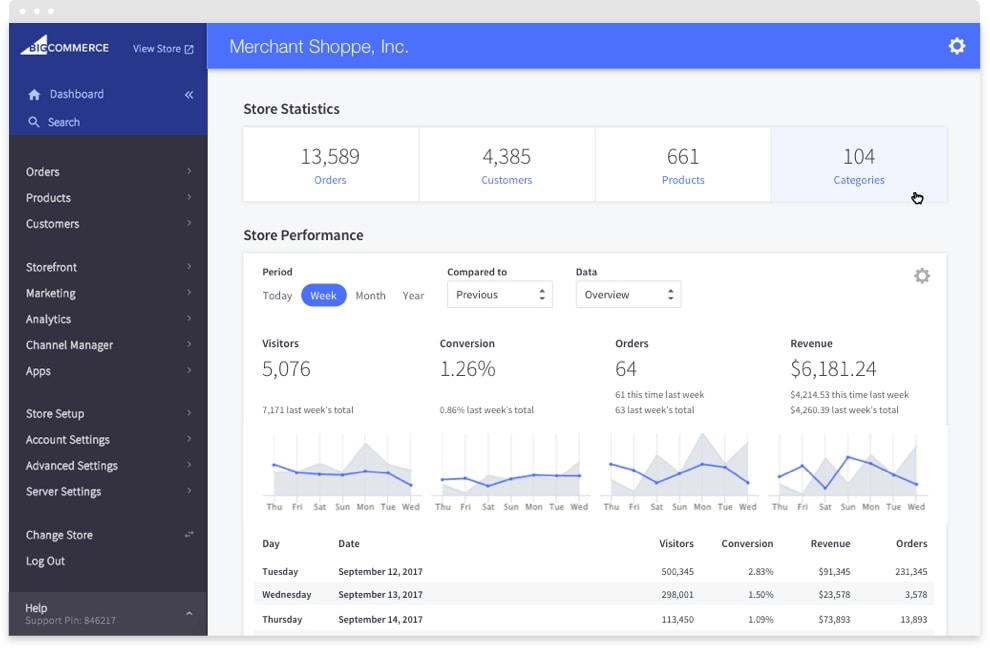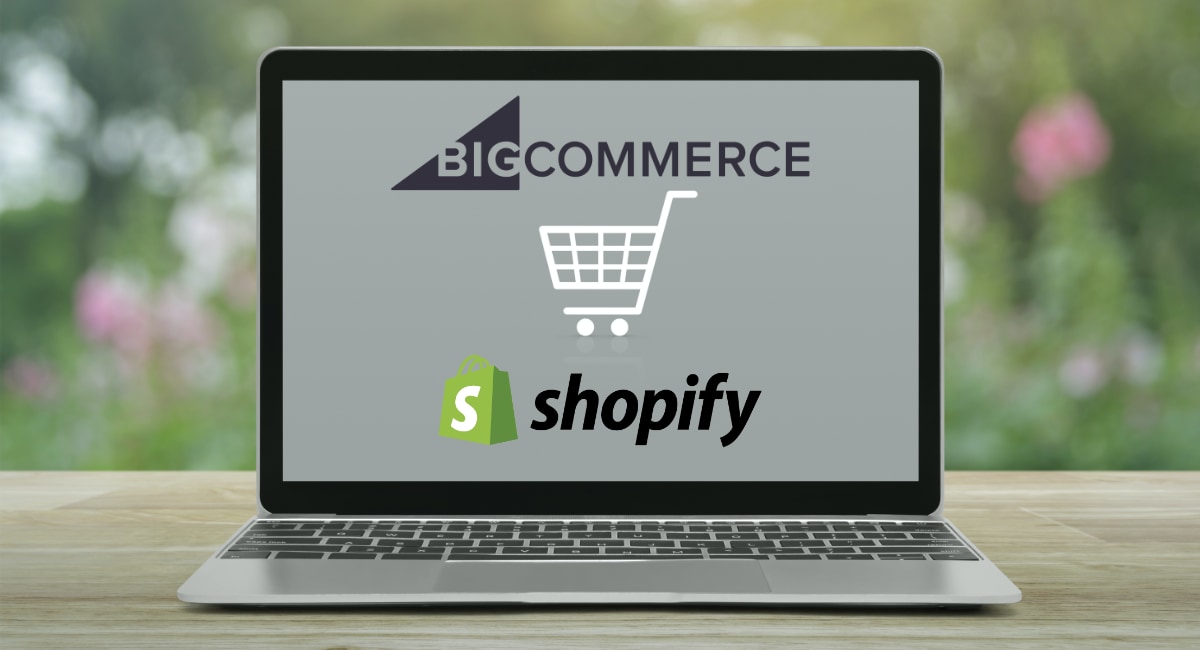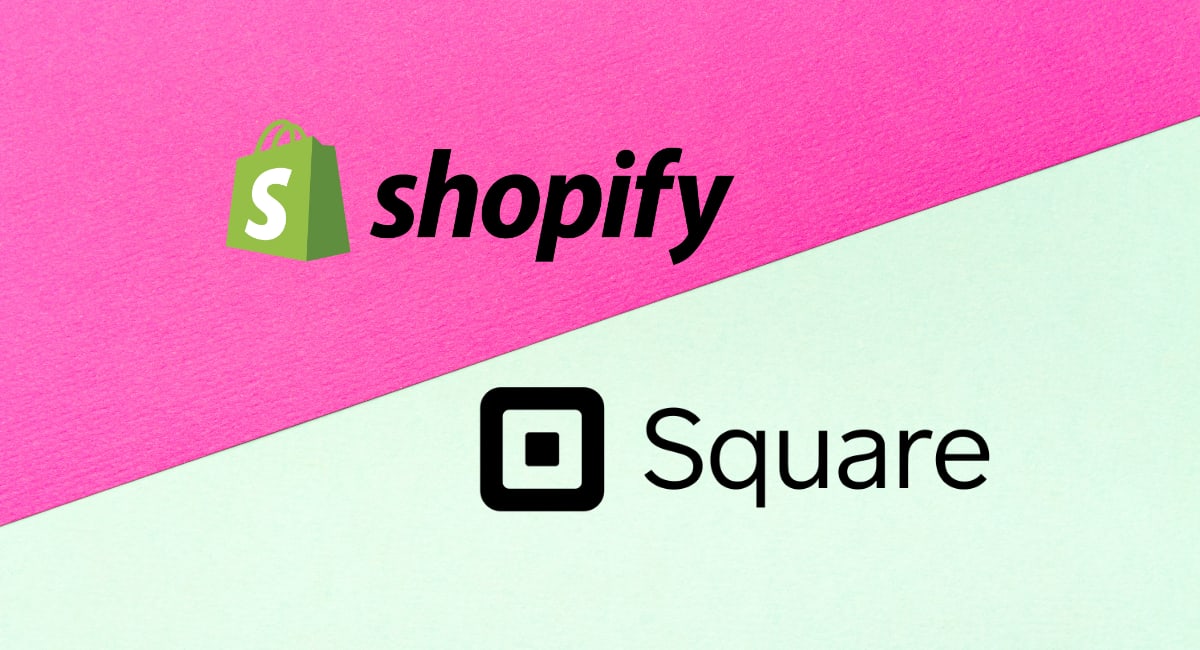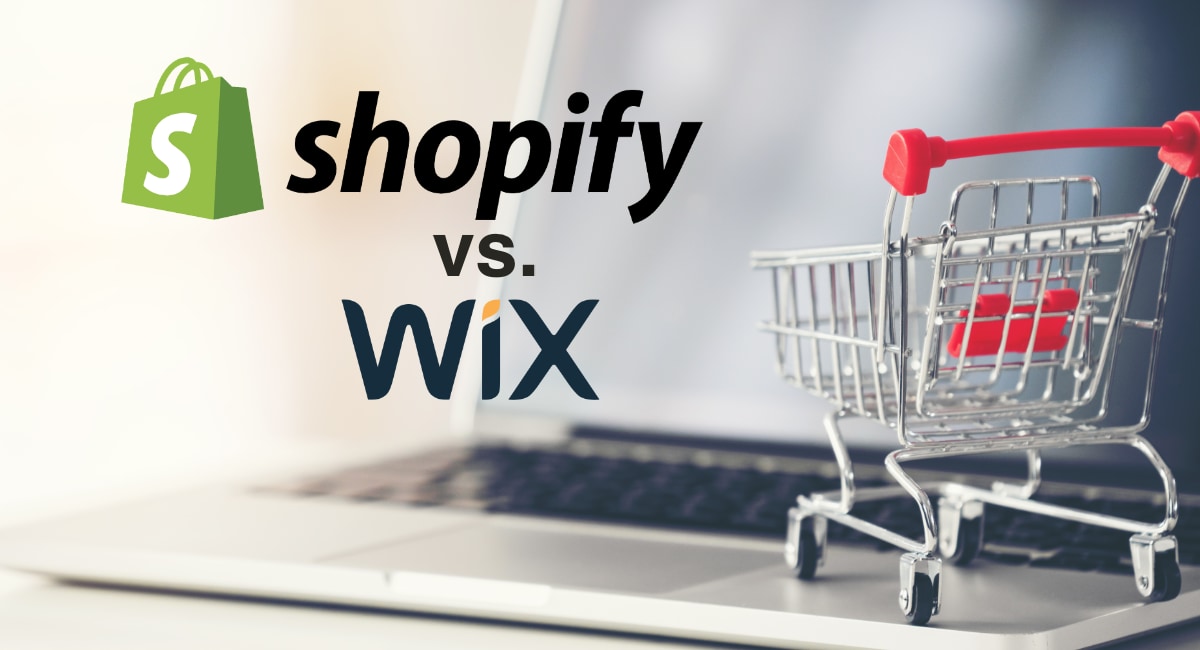Shopify is perhaps the best-known ecommerce platform in the UK, but BigCommerce’s impressive alternative is worthy of serious consideration. How do they compare?
They are similar in many ways, catering for small-to-large businesses depending on the subscription. They also accommodate for both in-person and online sales, so you’re able to sell across multiple sales channels seamlessly.
Let us look at the differences, focusing on the plans suitable for small-to-medium businesses.
 |
 |
|
|---|---|---|
| To website | ||
| Monthly fee | $29.95 – $249.95/mo | $21.75 – $299/mo |
| Instalment options | Monthly or annual | Monthly, annual, every 2 years or every 3 years |
| Contract | Cancellable any time, but no refunds of instalments | Cancellable any time, but no refunds of instalments |
| Integrated payments | None | 1.6% – 2.2% + 20p / transaction |
| Other payment processors | Choice of 23 payment solutions, no BigCommerce fee for using other provider | Wide choice of payment solutions, extra Shopify fee for using other provider |
| Web hosting | Included | Included |
| Website templates | 80+ (free or paid) | 72 (free or paid) |
| POS integration | Via payment gateway only | Shopify POS or via payment gateway |
| Additional apps | ~700 apps | ~3340 apps |
| Customer support | 24/7 on all plans | 24/7 on all plans |

|

|
|---|---|
| Monthly cost | |
| $29.95 – $249.95/mo | $21.75 – $299/mo |
| Instalment options | |
| Monthly or annual | Monthly, annual, every 2 years or every 3 years |
| Contract | |
| Cancellable any time, but no refunds of instalments | Cancellable any time, but no refunds of instalments |
| Integrated payments | |
| None | 1.6% – 2.2% + 20p / transaction |
| Other payment processors | |
| Choice of 23 payment solutions, no BigCommerce fee for using other provider | Wide choice of payment solutions, extra Shopify fee for using other provider |
| Web hosting | |
| Included | Included |
| Website templates | |
| 80+ (free or paid) | 72 (free or paid) |
| POS integration | |
| Via payment gateway only | Shopify POS or via payment gateway |
| Additional apps | |
| ~700 apps | ~3340 apps |
| Customer support | |
| 24/7 on all plans | 24/7 on all plans |
Ecommerce plans and pricing: very similar
Shopify and BigCommerce offer similar subscription plans, but there are some differences in prices.
Apart from the most popular plans – which we will here class as basic, regular and advanced – there are custom plans (BigCommerce Enterprise and Shopify Plus) suitable for high-volume businesses with a large budget for ecommerce. These comprehensive plans have tailored pricing which you can only get directly from the providers.
Our full review: BigCommerce UK – excellent for high-growth businesses
BigCommerce’s subscriptions for small-to-medium businesses are called BigCommerce Essentials plans (below table). These can be paid for monthly or annually. Shopify’s regular plans (below table) can be paid for monthly, annually, every two years or every four years. With both providers, the more you pay upfront, the less the price is when calculated on a per-month basis.
Below, we compare the prices for the monthly and annual plans. Despite their large user bases in the UK, both platforms charge for their subscriptions in US dollars.
| Basic plan | Regular plan | Advanced plan |
|---|---|---|
| BigCommerce subscriptions* | ||
| Standard | Plus | Pro |
| $29.95/mo (monthly & annual billing) For up to $50k sales/yr |
$79.95/mo (pay-monthly) $71.95/mo (annual bill) For up to $150k sales/yr |
$249.95/mo (pay-monthly) $224.95/mo (annual bill) For up to $400k sales/yr |
| Shopify subscriptions* | ||
| Basic Shopify | Shopify | Advanced Shopify |
| $29/mo (pay-monthly) $26/mo (annual bill) |
$79/mo (pay-monthly) $71/mo (annual bill) |
$299/mo (pay-monthly) $266/mo (annual bill) |
*Prices exclude VAT.
| Basic plan |
Regular plan |
High plan |
|---|---|---|
| BigCommerce subscriptions* | ||
| Standard | Plus | Pro |
| $29.95/mo (monthly & annual billing) For up to $50k sales/yr |
$79.95/mo (pay-monthly) $71.95/mo (annual bill) For up to $150k sales/yr |
$249.95/mo (pay-monthly) $224.95/mo (annual bill) For up to $400k sales/yr |
| Shopify subscriptions* | ||
| Basic Shopify | Shopify | Advanced Shopify |
| $29/mo (pay-monthly) $26/mo (annual bill) |
$79/mo (pay-monthly) $71/mo (annual bill) |
$299/mo (pay-monthly) $266/mo (annual bill) |
*Prices exclude VAT.
Furthermore, Shopify has a Lite plan for $9 monthly, but this is only for Facebook-selling and Pay Buttons you can embed on an existing website – in other words, you cannot build an online store with this plan.
BigCommerce imposes restrictions for online turnover on each plan: Standard restricts it to $50k a year, Plus to $150k and Pro to $400k a year.
Shopify does not have turnover restrictions, instead charging a fixed transaction rate for the built-in payments system Shopify Payments (accepts Visa, Mastercard, Maestro, Amex, Apple Pay and Google Pay):
| Shopify Payments fee | Shopify fee for using other payment provider | |
|---|---|---|
| Basic Shopify | 2.2% + 20p per transaction | 2% + transaction fee to chosen payment provider |
| Shopify | 1.9% + 20p per transaction | 1% + transaction fee to chosen payment provider |
| Advanced Shopify | 1.6% + 20p per transaction | 0.5% + transaction fee to chosen payment provider |
| Shopify Payments fee |
Shopify fee for using other payments |
|
|---|---|---|
| Basic Shopify | 2.2% + 20p per transaction | 2% + transaction fee to chosen payment provider |
| Shopify | 1.9% + 20p per transaction | 1% + transaction fee to chosen payment provider |
| Advanced Shopify | 1.6% + 20p per transaction | 0.5% + transaction fee to chosen payment provider |
If you use another payment processor on your Shopify website, you still pay a transaction fee to Shopify (to encourage using Shopify Payments instead) on top of the transaction fees to the chosen payment provider. This can make it pricey in the long run to opt for another payment provider than Shopify Payments.
BigCommerce does not have built-in card processing, so you need to connect your BigCommerce store with a payment gateway of your choice. There are no extra fees from BigCommerce’s end to accept payments – transaction fees are incurred by your payment processor only.
Payments: much choice, but Shopify penalises alternatives
Only Shopify offers payment processing built into the platform (transaction fees above). Alternatively, you can integrate with many other payment gateways, for example PayPal, Amazon Pay, third party processors, and many international payment providers like Alipay Global, BitPay and ePay.
If you plan on using another card processor, Shopify doesn’t charge the Shopify transaction rate, but you are charged an additional fee on top of the rates going to your chosen card machine provider. This additional “penalty rate” is between 0.5% and 2% of the transaction total depending on your subscription, which can make the overall transaction cost quite high.
BigCommerce hasn’t got a ready-made payment processing system, instead requiring you to integrate with any of 23 external payment gateways compatible in the UK, e.g. Adyen, Authorize.net, Klarna, PayPal, Sage Pay, Square, Stripe and PayPal. These have different costs associated, sometimes with a setup fee for the integration, but BigCommerce does not add their own fee on top like Shopify does.

Both platforms offer free and paid themes – examples of Shopify themes here pictured.
Ecommerce features: comprehensive, with intricate differences
The platforms offer similar ecommerce features, but the things included on each their cheapest plans are different. To be fair, both have a good amount of features necessary to build and manage an online store. Either platform’s entry-level plans will be enough for most small businesses starting out online.
These are features that all their regular plans have, including BigCommerce Standard and Basic Shopify (lowest-cost plans):
- Web hosting and free SSL certificate
- At least a handful of free web templates, and more to purchase
- Create and manage an online store and blog
- Unlimited products with categories, options, prices, stock levels, images etc.
- Pay buttons for social media selling
- Discounts, voucher codes and promotions
- Basic search engine optimisation (SEO) settings
- Shipping rate calculations
- Customer reviews of products
- Order management
The following are features not included on the basic plan with one provider, but included on all plans with the other.
| Feature | BigCommerce | Shopify |
|---|---|---|
| Abandoned cart emails | Not on Standard | All plans |
| Gift cards | All plans | Not on Basic |
| In-depth analytics | All plans | Not on Basic |
| Staff accounts | Unlimited on all plans | 2 on Basic, 5 on Shopify, 15 on Advanced |
| Product-filtered search | Only on Pro | All plans |
| Customer accounts & groups | Not on Standard | All plans |
| Feature | Big- Commerce |
Shopify |
|---|---|---|
| Abandoned cart emails | Not on Standard | All plans |
| Gift cards | All plans | Not on Basic |
| In-depth analytics | All plans | Not on Basic |
| Staff accounts | Unlimited on all plans | 2 on Basic, 5 on Shopify, 15 on Advanced |
| Product-filtered search | Only on Pro | All plans |
| Customer accounts & groups | Not on Standard | All plans |
Some of the above features may be important to you, so it’s really worth considering if you’re willing to upgrade to a higher plan than you hoped for, just so you can get that feature.
If you need more features, there are plenty of additional tools to integrate with: BigCommerce with around 700 apps and Shopify with a whopping 3340 apps. This means you’re never confined to the inbuilt ecommerce features, and you can get away with not upgrading to a pricier plan if additional apps meet your needs. Note that many of these extra apps require separate subscriptions that are sometimes costly.
Image: BigCommerce

BigCommerce includes complex sales analytics for everyone, while Shopify has some limits on lower plans.
User experience and customer support: so-so
In the past, BigCommerce was known to be too complicated for a small business, but the Essentials subscriptions have made it a lot easier to create and run an online store without a web developer. There are still features in BigCommerce with a bit of coding involved, but the comprehensive step-by-step guides and resources can help you deal with it.
Shopify has always been on the user-friendly side despite also having many features. The interface is intuitive for someone with a bit of ecommerce experience, but there are more intuitive platforms for complete ecommerce newbies (e.g. Wix and Weebly). Shopify also has a comprehensive online help section with guides, learning resources and a user forum.
Both providers have a round-the-clock customer support line, but customer reviews are mixed in both cases. None of the companies are based in the UK, so you won’t get through to someone with in-depth knowledge of how the UK differs from North American features (yes, there are some differences in features between locations). There are also users claiming to receive poor service on the cheaper plans, while only expensive subscriptions have priority support.
POS integration: included vs. freedom of choice
Both platforms can work with a POS system, but Shopify has ambitiously created their own POS app for iPad and iPhone, used with a Shopify card reader (costing £59 + VAT). The POS app is complimentary on all the ecommerce plans, but you do pay the Shopify transaction rate on all transactions through the card reader.
If you don’t want to use Shopify’s POS software, several till systems compatible with Shopify such as Vend POS, but Shopify adds an extra transaction fee if you choose another provider (same penalty fee as with ecommerce).
BigCommerce, on the other hand, hasn’t got their own POS system, but you can integrate it with Vend, Hike POS and Square Point of Sale. It varies how seamless these integrations are but Square + BigCommerce comes out-of-the-box as a free integration with the smoothest experience. If you choose Hike POS, the Hike team will manage the integration for you for free. It might incur costs to link up with Vend POS.
As with the online payment integrations, BigCommerce does not add extra fees for in-person payments through another POS system.
Compare options: Should you use Shopify POS or Vend POS + Shopify?
Verdict: close call
Shopify is one of the favourite ecommerce platforms in the UK, but BigCommerce is overall just as good value.
The final choice relies on your preference toward payments, i.e. do you want an out-of-the-box payment solution such as Shopify’s, or do you prefer BigCommerce’s freedom to choose any payment processor for no extra fees?
It’s also important to consider which features you need, as some are not available on the cheaper plans. Moreover, BigCommerce has a limit on online turnover for each plan, so even though they don’t charge for transactions themselves, you can’t have unlimited card takings on the lower plans as you can with Shopify.
We love BigCommerce’s many features, but the breadth of functions comes at the expense of better user-friendliness. Shopify is a bit easier to approach for someone inexperienced in ecommerce, but then again, there are better platforms if usability is your top priority.




